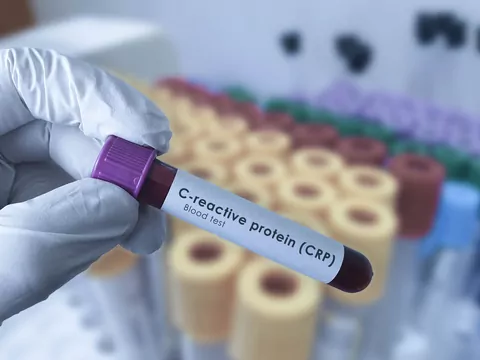The results of the test might be unclear sometimes when you are trying to figure out yourself what may cause CRP Blood Test Hight Level. There are many reasons and some other helpful information about CRP blood tests you should be aware of.
What is CRP Blood Test?
C-reactive protein (CRP) testing is a blood test that determines the level of C-reactive protein in your blood. C-reactive protein (CRP) is a blood test that determines how much inflammation is present in your body.
Infections and numerous long-term disorders create high levels of CRP. However, a CRP test can’t tell you where the inflammation is or what’s causing it. To determine the source and location of the inflammation, more tests are required.
What does CRP high level mean?

Inflammation is indicated by a high level of CRP in the blood. It can be caused by a number of things, ranging from infection to cancer.
High CRP levels can also signal inflammation in the heart’s arteries, which can lead to an increased risk of a heart attack. The CRP test, on the other hand, is a very broad diagnostic, and CRP levels can be increased in any inflammatory illness.
The amount of CRP in a liter of blood is measured in milligrams per liter (mg/L). In general, a low C-reactive protein level is preferable to a high one since it implies that the body is less prone to inflammation.
A value of less than 1 mg/L suggests a minimal risk of cardiovascular disease, according to the Cleveland Clinic.
You’re at intermediate risk if your blood sugar level is between 1 and 2.9 mg/L.
A value of more than 3 mg/L indicates a high risk of cardiovascular disease.
A value of more than 10 mg/L may indicate the need for additional tests to establish the source of such severe inflammation in your body. This unusually high value could indicate:
C-reactive protein is measured in milligrams of CRP per liter of blood (mg/L). In general, a low C-reactive protein level is better than a high one, because it indicates less inflammation in the body.
According to the Cleveland Clinic, a reading of less than 1 mg/L indicates you’re at low risk of cardiovascular disease.
A reading between 1 and 2.9 mg/L means you’re at intermediate risk.
A reading greater than 3 mg/L means you’re at high risk of cardiovascular disease.
A reading above 10 mg/L may signal a need for further testing to determine the cause of such significant inflammation in your body. This especially high reading may indicate:
- tuberculosis
- a bone infection, or osteomyelitis
- IBD
- an autoimmune arthritis flare-up
- lupus, connective tissue disease, or other autoimmune diseases
- pneumonia or other significant infection
- cancer, especially lymphoma
Doctors disagree about the consequences of elevated CRP levels. Some experts feel that elevated CRP levels are linked to an increased risk of heart attack or stroke.
According to the Physicians’ Health Study, healthy adult males with high CRP levels are three times more likely to suffer a heart attack than those with low CRP levels. This was among males who had never suffered a heart attack before.
This test may be ordered in conjunction with others to determine a person’s risk of heart disease or stroke. CRP may potentially be utilized as a predictor of health outcomes in chronic obstructive pulmonary disease, according to new research (COPD)
This test may be ordered in conjunction with others to determine a person’s risk of heart disease or stroke. CRP may potentially be utilized as a predictor of health outcomes in chronic obstructive pulmonary disease, according to new research (COPD). A CRP test may also be ordered by doctors to diagnose inflammatory autoimmune disorders such as:
Irritable bowel syndrome (IBD)
Rheumatoid arthritis is a type of arthritis that affects the joints.
Lupus.
